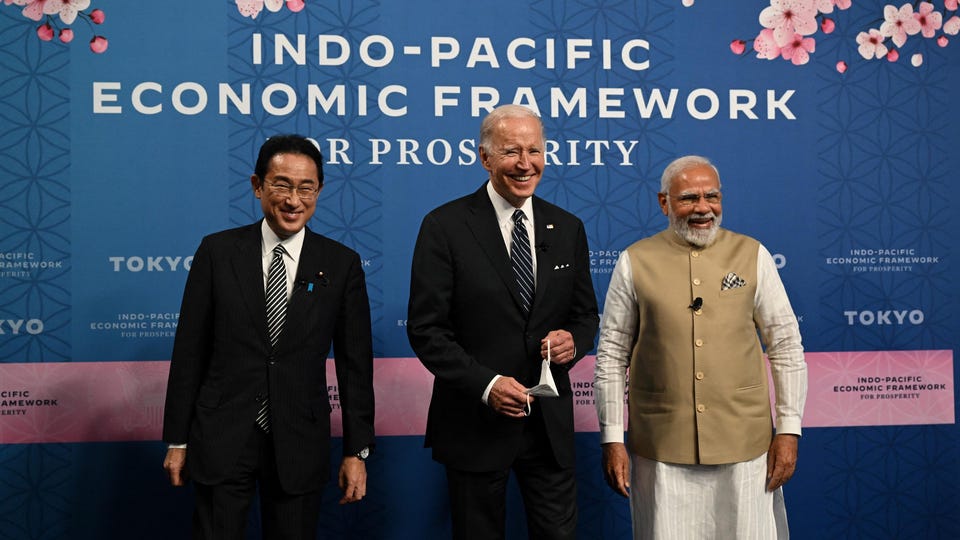Asia Is Biden’s Indo-Pacific Economic Initiative A Trade Deal By Stealth? India’s Actions Suggest So Vasuki Shastry Contributor Opinions expressed by Forbes Contributors are their own. I write about Asian economics and technology news. Following New! Follow this author to stay notified about their latest stories.
Got it! Sep 19, 2022, 03:35am EDT | Share to Facebook Share to Twitter Share to Linkedin From L-R: Japan’s Prime Minister Fumio Kishida, U. S. President Joe Biden and India’s Prime Minister .
. . [+] Narendra Modi attend the Indo-Pacific Economic Framework for Prosperity at the Izumi Garden Gallery in Tokyo on May 23, 2022.
SAUL LOEB/AFP via Getty Images When India signed on to the Indo-Pacific Economic Framework (IPEF) , the Biden administration’s signature Asian economic initiative, the critics were confounded. India, after all, was notorious for staying away from regional trade arrangements, formal or informal, due to concerns over sovereignty and the need to protect its domestic champions. Yet, here was New Delhi enthusiastically backing IPEF, which also includes many of the pro-trade countries in the region, including Australia, Singapore, Vietnam, and even Japan and Korea.
The critics, it turns out, were vindicated the week before last, when India announced that it would withdraw from the trade track of the IPEF, but remain an active member in other aspects, such as the ones focused on advancing supply chain resilience, clean energy, and tax and anti-corruption issues. Trade and Industry Minister Piyush Goyal explained India’s decision not to participate this way: “India will be watching what benefits member countries will derive and whether any conditionalities on aspects like environment may discriminate against developing countries. ” Wait a minute.
Even its most enthusiastic backers point out that the IPEF is not a regional free trade agreement, like the Regional Comprehensive Economic Partnership (RCEP), which India also pulled out of over China import dumping concerns, and the Comprehensive and Progressive Agreement for Trans-Pacific Partnership (CPTPP), which involves the same countries, excluding China and America, the latter having pulled out in 2017 despite being the originator of the idea. The Biden administration has positioned IPEF as a platform for like-minded countries in Asia to engage with one another on emerging issues—reconfiguring supply chains which are primarily dependent upon China; managing global data flows at a time when China is building its own parallel standards; investments in clean energy, decarbonization, and lastly, to strengthen corporate tax compliance and combat corruption. MORE FOR YOU China Detains Fallen HNA Ex-Billionaire Chairman Ahead Of Airline Restructuring Vote Nasdaq Listing Of Freshworks Creates Windfall For Indian Founder And Hundreds Of Employees Ninja Van Becomes Singapore’s Newest Unicorn After Raising $578 Million From Alibaba, B Capital Between the launch of the IPEF in May 2022 and the ministerial meeting in Los Angeles the week before late, India has gone from energetic cheerleader to conditional supporter.
One possible explanation for the transformation is that trade seems to have become the centerpiece of the IPEF. Although as Matthew Goodman of CSIS points out that “IPEF parties do not plan to negotiate trade liberalization,” they appear to be doing exactly that. A majority of IPEF signatory nations see their membership of the framework as a way to persuade America, which has ruled out participation in the CPTPP, to provide preferential access to its huge market.
The other members are using trade access as leverage in consenting to supporting the other pillars of the IPEF. In short, this is precisely the opposite of India’s approach. Despite protestations from Washington, IPEF members view the framework as a free trade arrangement in stealth—where America offers the access it would have under the CPTPP in exchange for support in countering China’s economic ambitions.
Biden, Kishida, and Modi attend the Indo-Pacific Economic Framework for Prosperity with other . . .
[+] regional leaders via video link at the Izumi Garden Gallery in Tokyo on May 23, 2022. SAUL LOEB/AFP via Getty Images Vasuki Shastry Editorial Standards Print Reprints & Permissions.
From: forbes
URL: https://www.forbes.com/sites/vasukishastry/2022/09/19/is-bidens-indo-pacific-economic-initiative-a-trade-deal-by-stealth-indias-actions-suggest-so/



